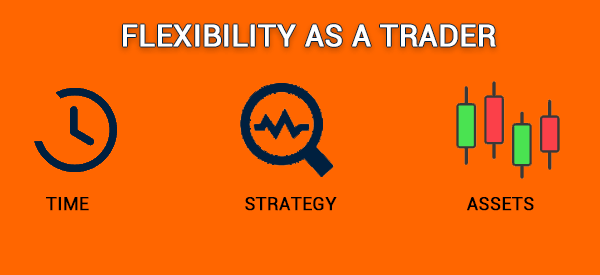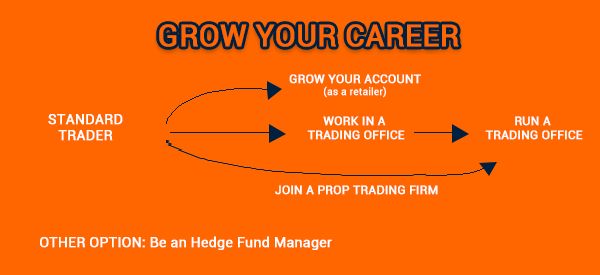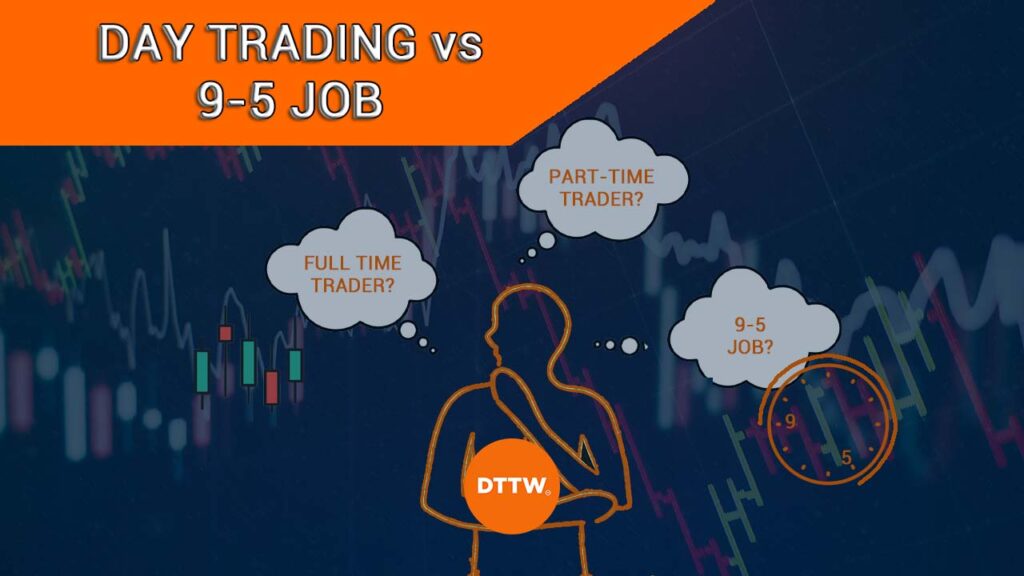Day trading has become popular in the past few years. Its popularity grew rapidly during the Covid-19 pandemic as more people spent most of their time at home. They also had a lot of money, thanks to low-interest rates and giant stimulus checks.
This growing popularity has led many people to consider pursuing a professional career as a trader, abandoning their standard job. Is this actually a good idea?
In this article, we will compare the difference between being a full-time trader and having a standard 9-5 job.
Table of Contents
How to be a part-time trader
A common question among most people is on how to be a part-time trader when you have a 9-5 job. This is a common thing that has been made possible by the fact that most online brokers provide easy-to-use mobile applications.
It is not uncommon to see many full-time employees trading using their Robinhood accounts during breaks.
In addition, being a part-time trader is a viable option because the financial market is usually open for longer period.
The forex market is open for 24 hours Monday to Friday while the crypto market is open for 24 hours, seven days a week. Therefore, as a part-time trader, you can easily trade after work.
Most importantly, in the United States, brokers offer pre-market and extended sessions to traders.
Therefore, you can place your trade set-ups before you go to work or after the market closes. So, here is a comparison on how to be a full-time trader vs having a full-time job.
Related » How to Trade Part-Time When You Have a Full-Time Job
Why day trading is better than a 9-5 job
Before proceeding with our analysis have two notices to give you. You should start trading/move into a full-time trading career only if your passion for the markets is strong enough. That of a day trader is hard work, requiring commitment and perseverance.
In addition, many of the points we will list are objective, but they also depend on the approach you will have with your business.
More flexibility as a trader
Day trading is more flexible than being a full-time employee. There are several ways in which this flexibility is manifested.
For example, as a full-time trader, you can be flexible on the assets you trade, the strategy you use, and the time you trade.

Let’s talk about assets. Here you can decide to trade :
- stocks
- currencies
- commodities
- indices
- exchange-traded funds (ETFs)
- bonds
You can also focus on trading options, futures, and synthetic assets.
Are you interested in stocks? Again, there are plenty of sectors to choose from…and each industry has a plethora of different stocks! That’s why many traders try to focus only on the most active stocks in a given day.
Forex, commodities and the other assets also offer many different solutions (and you certainly can’t monitor them all).
On time, you can focus on trading for just a few hours per day. In fact, many day traders trade for less than 2 hours per day.
They do this by conducting technical and fundamental analysis and then placing their trade setups. Finally, they open their trades, set their take-profit and stop-loss, and then wait for their trades to develop.
Therefore, there is a lot of flexibility when you are a full-time trader compared to when you have a 9-5 job. Most people with jobs tend to do the same thing on a daily basis.
Chance to grow
Another reason why day trading is better than having a full-time 9-5 job is that there is a chance to grow. While many jobs offer a clear career growth paths, the reality is that most people don’t experience this growth. At times, most people find themselves in the same position for decades.
With trading, there are many ways to grow your career.

For one, it is possible to grow your account from $10,000 to millions within a few years. Obviously, this will depend on how successful you are as a trader.
At the same time, if you are a prop trader working for a floor owner, your success can see you move on to become a successful floor owner yourself. At Real Trading, we have seen many people move from being employed as floor owners to becoming independent operators themselves.
Another way of growing is shifting your trading operation into a home office or hedge fund. This is a process where you use your success as a trader to raise capital from other people and then take a fee. We have seen so many people do that.
Related » How to Become a Successful Trader Starting Small
Work-life balance
Work-life balance is an important thing. Sadly, many people working for companies don’t have this balance since they spend too much time in their offices.
While this usually attracts some overtime pay, the reality is that many people spend a lot of time working. Many parents also have a very limited amount of time with their families.
Day trading is the opposite. For one, most people day trade when in their home offices. As such, they usually have a lot of time with their families. Also, because of flexibility, they can attend their kids’ school events and even spare some of their days to spend time with them.
Warning. What we have said is true in most cases, but it is up to the trader not to fall into some sneaky traps:
- FOMO. Fear of missing out on a good trade can lead to spending all your time waiting for a trigger that often never comes.
- Overtrading. Being scared of missing a good profit opportunity often leads to trading considerably more than we had planned.
- Revenge Trading. Suffering unexpected losses could undermine our minds, blow up all our plans, and try to recover this loss immediately, often relying on instinct rather than analysis. You can imagine the potential damages.
- Greed. The opposite is also true. Having one or more winning days could lead us to want more and more profits, removing this balance between work and free time.
Constantly learning
Another benefit for being a day trader instead of having a full-time job is that you will constantly learn in the market. This is notable since most days are never the same.
At times, there will be some geopolitical events that will affect the market. In other periods, there are events like Fed decisions, earnings, and corporate announcements.
Unfortunately, many people in the corporate sector don’t have the attitude to learn at all times. For example, an accountant will constantly repeat the same process year in, year out.
If continuing education and studying new material scare you, trading is probably not the right career. In that case, you might still consider becoming a long-term investor.
Pros of a 9-5 job
Still, having a full-time job has its pros. First, earning a certain amount of money per month is a good thing since it helps you plan your future.
For example, you can take a mortgage comfortably since you are assured that you will receive your monthly salary. With trading, nothing is guaranteed. Some months will be positive while others could be bad.
Second, many companies offer a vacation period. As such, you can spend your free time to travel the world and to reconnect with friends.
Third, having a job is a good thing for social reasons. As an independent trader, you will often work alone. On the other hand, as an employee, you will have a chance to interact with your colleagues.
A platform like Jooble can be a great help in finding a 9-5 job. Or, you could try the (difficult) way of trading despite having a 9-5 job.
Summary
In this article, we have looked at the benefits of being a full-time trader compared to being an employee. As you have seen, there are pros and cons of both.
However, in our experience, we believe that having a hybrid of being a full-time employee an a part-time trader is a good thing for most people to start their career.
With this approach, you can asses if day trading is the right choice for you. Then, if it’s your path, this will help you transition to become a good full-time trader.





